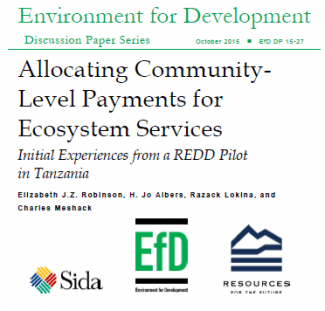FILTER
Displaying 631 - 640 of 1126 publications
This is a chapter in the book entitled ‘How can Tanzania move from poverty to prosperity?’ The idea for this book first originated in 2012 when writing a paper for a workshop for the University of Dar…
| Book Chapter | TanzaniaThis is a chapter in the book entitled ‘How can Tanzania move from poverty to prosperity?’ The idea for this book first originated in 2012 when writing a paper for a workshop for the University of Dar…
| Book Chapter |How may environmental regulation affect firm location choice? While this question has generated great research interest from high-standard, industrial economies, in this article we turn the spotlight…
| Peer Reviewed | ChinaCentral to this special issue is the notion that the methods and conceptual tools of comparative politics can improve our understanding of global climate change politics. Building on recent…
| Peer Reviewed | TanzaniaThis past Thursday November 19th “La Nación” (the main newspaper in Costa Rica) published an article highlighting the work done for a special report about the impact evaluation of conservation…
| Other Publications | Central AmericaAbstract: Harrington (J Public Econ 37: 29-53, 1988) shows that a suitable strategy for regulators to make enforcement more efficient is to target surveillance resources according to past compliance…
| Peer Reviewed | SwedenWe analyze optimal social discount rates when people derive utility from relative consumption, i.e. their own consumption level relative to the consumption level of others. We compare the social…
| Peer Reviewed | SwedenWhen designing schemes such as conditional cash transfers or payments for ecosystem services, the choice of whom to select and whom to exclude is critical. We incentivize and measure actual…
| Peer Reviewed | Central America, SwedenWe use city-level data from the daily air pollution index and meteorological data on wind movement to see whether air pollution in China spills over from one city to another. We find that (i): a city…
| Research Brief | ChinaPayments for ecosystem services (PES) typically reward landowners for managing their land to provide ecosystem services that would not otherwise be provided. REDD— Reduced Emissions from Deforestation…
| EfD Discussion Paper | Tanzania